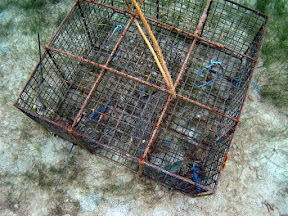Overfishing: Difference between revisions
From coraldigest
| Line 4: | Line 4: | ||
<b>1. Introduction</b><br> | <b>1. Introduction</b><br> | ||
 a. Ecological extinction precedes that by all other factors (Jackson et al. 2001)<br> |  a. Ecological extinction precedes that by all other factors (Jackson et al. 2001)<br> | ||
& | b. Global fishing effort has steadily increased since 1970 (Antimcamara et. al, 2011)<br> | ||
<b>2. History</b> (Jackson et al. 2001)<br> | <b>2. History</b> (Jackson et al. 2001)<br> | ||
a. Time periods <br> | a. Time periods <br> | ||
Revision as of 22:04, 25 February 2013
Overfishing

1. Introduction
a. Ecological extinction precedes that by all other factors (Jackson et al. 2001)
b. Global fishing effort has steadily increased since 1970 (Antimcamara et. al, 2011)
2. History (Jackson et al. 2001)
a. Time periods
i. Paleological sedimentary records
ii. Archeological records from human coastal settlements
b. Written historical documents
i. Ecological records from scientific literature
ii. Geographic effects
iii. Aboriginal use (subsistence exploitation)
iv. Colonial use (systematic exploitation)
v. Global use
3. Causes
a. Socioeconomic
i. Exploitation of coral reef fisheries is largely due to a high demand on the global market rather than the density of the local human population. (Cinner and McClanahan, 2006)
ii. Overfishing cannot be quickly stopped because it is heavily tied to economic growth. Fishing pressure is increasing even as global catch declines (Bradbury, 2012)
4. Effects
a. Food web
i. Herbivorous Fish
1. Dense populations of grazing fish and sea urchins abate harmful algae growth (Smith 2010)
2. Can have profound top-down ecosystem effects from removing top predators (Scheffer et al. 2005)
3. By fishing down the food chain, they too become overfished or die of diseases due to overcrowding (Jackson et al. 2001)
ii. Algae/Corals
1. Excessive fishing of predatory fish leads to explosions in the populations of lower level consumers. These populations then overgraze on coralline algae and cause coral abundance to decrease (Stephens, 2012)
2. Can cause phase shift and eventual replacement of slow-growing corals by fast-growing seaweeds (Smith 2010)
3. Coralline algae reduced through cascading trophic effects that increase sea urchin populations (O’Leary et al. 2012)
4. Some species of algae are important for coral recruitment
5. Overfishing causes indirect cascading effects on settlement
b. Physical effects
i. Coral structure can be physically damaged by netting and trapping techniques. Use of explosives and chemicals in fishing is more rare, but can also damage the corals and substrate (Jennings and Polunin, 1996)
c. Losses of biomass and abundance (Jackson et al. 2001)
d. Precursor for eutrophication, disease, and species introduction as it makes populations more vulnerable (Jackson et al. 2001)
5. Fisheries Management
a. Aquaculture
i. Culturing suspension feeders such as oysters can mitigate eutrophication and improve water quality (Jackson et al. 2001)
b. Management Practices
i. Value the role of attracting predatory fish as coral reefs exhibit an inverted biomass pyramid
ii. Fisheries management has predominantly focused on bottom-up processes, but the increasing role effects of overfishing has altered trophic level interactions (Valentine and Heck, 2005)
iii. Large-scale connectivity of organisms in coral reef ecosystems makes small-scale management practices difficult and often ineffective (Roberts, 1997)
1. Increase scale of management in areas with upstream reefs
2. Local management may be effective in areas with low connectivity
iv. Manage reefs for higher cover of settlement-inducing crustose coralline algae (O’Leary et al. 2012)
v. Ecosystem-based management necessary for predicting and avoiding cascading effects (Scheffer et al. 2005)
vi. Integrated management for multiple goals on ecosystem scale (Jackson et al. 2001)
6. References